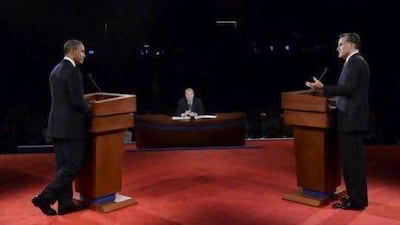WASHINGTON // Sesame Street's Big Bird may feel endangered, but Mitt Romney is flying high after the first US presidential debate.
Universally acclaimed the winner by the US media, a snap CNN poll found that 67 per cent of registered voters felt Mr Romney won the first of the three debates against the president, Barack Obama - even after saying he would cut funds to the Public Broadcasting Service, home to Big Bird.
Better prepared and more aggressive in the first head-to-head with the incumbent, the challenge for Mr Romney now is to build on Wednesday's performance, hoping it will provide more than temporary respite for a campaign that had seemed moribund.
Intrade, a political-futures prediction company, suggested Mr Romney's chances of winning the election had improved by nearly 25 per cent after his performance.
Illustrating how far he still has to go, though, Intrade still has Mr Obama as the 2-to-1 favourite to win on November 6.
"What it's done is stopped the media narrative that this race is almost over," said Richard Benedetto, professor at the school of communications of American University in Washington DC.
"You can't report it that way any more."
The debate was a "game changer", said Jeffrey Weiss, a Washington-based political consultant and veteran of several Republican presidential campaigns.
"My guess is that the Obama camp is reeling today and we may look back on this first debate as the tipping point in a very tight election, towards a Romney victory."
Mr Romney's campaign sent out an email yesterday morning with the headline, "Victory is in Sight".
Marco Rubio, a Republican congressman from Florida, said Mr Romney had "showed his grasp of the challenges that threaten to diminish America", challenged Mr Obama's "mediocrity" and ensured the election race "will never be the same".
But Democrats suggest that Mr Romney's performance was artificially boosted by very low expectations. Before the debate, some Republicans had voiced fears that Mr Romney's campaign would be a repeat of the unsuccessful challenge of Bob Dole to Bill Clinton in 1996. On that backdrop, the Republican only had to "string sentences together and sound reasonably intelligent" to score a victory, said Steve McMahon, a former media adviser to Democrat Howard Dean who ran for the presidential nomination in 2004.
"And when your campaign has been imploding for the last month it's an even bigger victory. So in a sense, Mitt Romney didn't have to do anything to win except not be a bumbling fool."
By contrast, Mr Obama had run almost too good a campaign.
"People just assumed that it wasn't possible the president wouldn't wipe the floor with Mitt Romney," Mr McMahon said.
Much will now depend on how the substantial issues that were raised will play out in the next weeks.
In Wednesday's debate, which focused exclusively on domestic policy, Mr Romney sounded more certain of himself against an at times unusually hesitant Mr Obama. But he has yet to answer charges that he is short on detail for how he intends to address the US's budget deficit with a plan heavily reliant on tax cuts.
He has said he would end tax loopholes, cut funding to some government programs - including funding for the Public Broadcasting Service - and repeal Mr Obama's signal achievement, the Affordable Care Act healthcare reform.
But Mr Obama charged that the maths simply did not add up, and Democrats are likely to step up such attacks in the next days and weeks.
Pundits suggest Mr Obama made the mistake of playing it too safe in the first debate. Heeding the adage that "if your opponent is self-destructing, step aside and let him get on with it", Mr Obama failed to foresee the "different guy" Mr Romney turned into on the night of the debate, said Mr McMahon.
Notably, Mr Obama chose not to invoke his opponent's record with Bain Capital, a financial services firm with which Mr Romney made a large part of his fortune. Nor did the American president refer to comments Mr Romney made in May apparently disparaging 47 per cent of Americans as welfare dependants.
That is likely to change, said Mr Benedetto.
"I think the gloves will come off and President Obama will try to get much tougher with Governor Romney."
At a very minimum, Mr Romney's debate performance will ensure that all eyes will now be on the second presidential debate in New York on October 16, a debate in which foreign policy will also come under scrutiny.
This time, it is Mr Obama who has something to prove.
okarmi@thenational.ae

